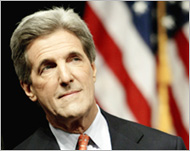Iran nuclear deal ‘tied to US election’
Analysts have said Iran will wait until after the US elections to respond to a European offer to avoid possible UN sanctions by indefinitely suspending uranium enrichment.

The analysts added the deal had no chance of success if the United States did not back the British-French-German offer, which includes non-nuclear items such as supporting Iran’s joining the World Trade Organisation.
According to a confidential document prepared by the Europeans in advance of the talks, Britain, France and Germany presented Iran on Thursday with a deal to receive valuable nuclear technology if it indefinitely suspended all uranium-enrichment activities.
The deal includes a light-water reactor which would produce less fissionable material than the heavy-water reactor Tehran wants to build.
Iran said the talks would continue. “We are at an initial stage, matters have to be considered on both sides,” Iranian official Cyrus Naseri told reporters after the three-hour meeting in Vienna.
Endgame talk
“It was pretty clear that this meeting would not be decisive,”
Gary Samore of the London think-tank International Institute of Strategic Studies, said on Friday.
 |
|
On November 25, the IAEA will |
“This is the beginning of the endgame, not the endgame,” Samore said. The meeting was to give Iran a last chance to come clean before the International Atomic Energy Agency (IAEA) decides on 25 November whether Iran is cooperating or not.
The United States wants the Vienna-based IAEA, which since
February 2003 has been investigating Iran on US claims that the Islamic Republic has a covert nuclear weapons programme, to send Iran to the UN Security Council, which could impose punishing sanctions.
But the European trio have so far opposed this, favouring instead a policy of “constructive engagement” to get Tehran to cooperate.
Election calculations
Samore said he thought the Iranians were “waiting for the US
elections” on 2 November, with different calculations depending on whether incumbent President George Bush or his challenger John Kerry wins.
Samore said the Iranian goal is to have the international
community recognise its right to uranium enrichment, which makes fuel for civilian reactors but can also manufacture the explosive material for atomic bombs.
 |
|
Iran might try to take advantage |
The Iranians might try to take advantage of a Kerry victory by agreeing to a three-month full extension from November until when Kerry takes office in January.
“I think if Kerry wins, Iran would strike a compromise that
would essentially delay the issue until early next year,” Samore said.
“I don’t get a sense that Iran is ready to agree to the
suspension. I could see the Iranians restoring the suspension for only a brief period of time,” Samore said.
Assurances wanted
But David Albright, a former IAEA inspector and president of the Washington-based Institute for Science and International Security, said, he “can’t believe Iran would turn down” the European trio’s package, which includes a recognition of Iran’s right to peaceful nuclear technology, measures to increase trade and backing of some of Iran’s regional security concerns.
“If Iran turns this down, reasonable people would have to
[conclude] the country wants nuclear weapons,” Albright said.
Albright, who is a physicist, said he was concerned about
offering Iran a light-water reactor, since this can still produce
fissionable material, but he said he thought the risks could be
managed by using the right fuel, namely 19% enriched
uranium.
Albright said the larger problem is that “Iran wants assurances
from the United States that Washington is not going to overthrow the Tehran regime”.
The deal “can’t move forward without the United States buying into it”, Albright said.